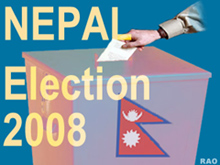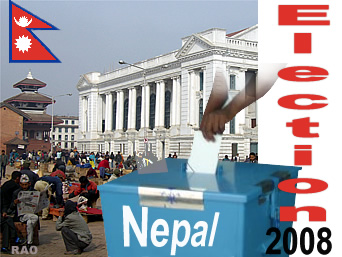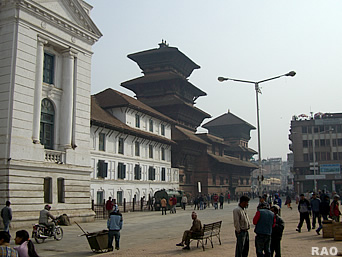 |
| Nepal 2008: Elections |
|
|
|
|
|
|
| ANFREL urges action to stem increasing pre-election violence |
| Culture of impunity for election-related violence must end |
KATHMANDU, 31 March 2008, ANFREL
 |
|
Rivalry between political parties has often manifested itself in violence and intimidation. In certain districts both in the hills and the Terai, candidates have been unable to campaign freely and voters fear they will not be able exercise their freedom of choice; of the political parties, CPN-Maoist and Young Communist League cadres were overwhelmingly identified as the main aggressors. Current efforts to engage armed groups have not yet been successful in curbing the climate of fear in some districts in the eastern and central Terai.
The primary responsibility for addressing violence and intimidation lies with the groups committing such acts - political party leaders, despite their public proclamations, have not done nearly enough in this regard. However, the response by the authorities responsible for enforcing the law has also been inadequate.
"There is not the political will at the moment to vigorously pursue those who break the law. The risk of this approach is that a culture of impunity emerges where party cadres and other groups run rampant, safe in the knowledge that they won't face serious consequences. It is misguided to think that not enforcing the law will provide for a fairer election environment," said Ichal Supriadi, ANFREL's Mission Coordinator.
"Similarly,
the peace accord should be strictly adhered to. In this regard, we are
concerned about reports from our observers that combatants from Maoist
cantonments have been leaving in large numbers, and urge them to return
immediately," concluded Mr. Supriadi.
| ANFREL Second Pre-Election Report: Security and freedom to campaign |
With only a little over one week left before polling day, the prime factor destabilizing the run-up to the elections remains election-related violence and intimidation. While a number of groups have instigated attacks, the main sources of violence have been the Maoists and armed groups in the Terai. While parts of the hills in the Western and Far-Western region have witnessed significant intimidation, the greatest region of concern for ANFREL is the eastern and central Terai. Bombings by armed groups1 are having an impact not only on those who have tragically lost their lives or been severely injured, but also on the spectrum of other election stakeholders: election officials, candidates, observation groups, and security services.
Incidents of intimidation and violence related to the increasing rivalry between competing political parties and candidates has affected the ability of candidates to assemble freely and campaign effectively in their constituencies and, in some cases, even to compete in the election in the first place: examples of candidates receiving pressure to withdraw from the election include two independent candidates in Taplejung after receiving pressure from CPN-M, and in Ilam district, where an independent candidate received strong warnings from the UML to withdraw.
ANFREL observers pointed most frequently to the Youth Communist League (YCL) as the primary aggressor in violent conflicts between political parties. During the 20-26 March reporting period, in the Eastern region districts (Dhankutta, Morang, Saptari, Sirah, Sunsari and Udaypur), YCL cadres caused disruptions at various campaign meetings e.g. injuring a candidate at a UML meeting in Sirah district, disturbing a meeting of the Rastryo Janshakti Party in Sansuri district, and disrupting a RPP party meeting in Chanwara VDC in Dhankutta.
However, ANFREL notes that Maoist cadres have also been subject to violence and at least eight have lost their lives since the beginning of election campaigning, and that other youth groups such as UML's Democratic National Youth Federation (DNYF) are also not fully respecting the freedom of other parties to campaign.
Such insecurity and instability has affected candidates and voters primarily, but also other stakeholders such as the police and election observers. ANFREL observers received a verbal threat from a group of political party cadres in Sunsari district that they would be physically harmed, though the observers were able to successfully negotiate a peaceful resolution with
1
E.g.s Nearly daily bomb blasts in Janakpur and Birgunj - on 31 March
three bomb blasts in Janakpur claimed by JTMM, two bomb blasts in Birgunj
that injured two claimed by Madheshi Tigers and another in Sarlahi; the
attack on a mosque in Biratnagar on 29 March; three bomb blasts set off
by the Janatantrik Terai Mukti Morcha (JTMM-G) party on 26 March in Birgunj,
Parsi district; two separate bomb blasts occurring on the same day, in
eastern Jhapa district as well as in Barsa district by the Madheshi Liberation
Tigers
the
cadres directly. National election observers have faced more widespread
intimidation that has had a direct impact on their work e.g. nearly 10%
of the local observers from one large monitoring group assigned to the
Eastern region district of Parsa had reportedly dropped out due to security
conditions. Security forces have faced difficulties in carrying out their
duties e.g. in VDC Fulkaha Katti in Sirah district, armed police forces
were ambushed, injuring three.
Reports from the Far Western and Western regions show a mixed picture. In Lumbini, for example, non-Maoist candidates expressed that their efforts to campaign are not being obstructed, though voters reported widespread intimidation, with Maoist engaging in fear tactics against rural villagers, threatening physical harm if people do not vote for CPN-M. In Lamjung district, another Maoist stronghold, the observer team witnessed much better inter-party cooperation between the CPN-M and other parties, as well as close cooperation with the local district administration resulting in a much safer environment for campaigning.
In the neighbouring district of Gorkha, however, YCL cadres are found to regularly disrupt other candidates' freedom of assembly and campaign efforts, particularly those from NC and UML. In Gorkha the YCL have prevented NC and UML candidates and cadres from campaigning freely in remote areas which Maoists perceived as their strongholds e.g:
- On 31 March in Gorka constituency 3, in Arughat village, the local NC candidate's home was surrounded for over three hours by hundreds of YCL cadres who stoned his house
- On 24 March in Pokhara YCL cadres disrupted amass meeting organised by RPP-Nepal where ex Home Minister Mr. Kamal Thapa was addressing a mass meeting
- On 23 March school headmaster Mr. Basudev Neupani, a local NCP member, was abducted from his home in Dharma Pani VDC and was released after 24 hours
Again,
the dynamics of inter-party violence often involve the YCL, but not exclusively
so
e.g.
on 21 March, NC cadres attacked CPN-UML cadres of Ghansikuwa VDC in Tanahun
district. NC cadres entered the house of student union President Mr. Ramesh
Acharaya, a pro-UML member and assaulted him and his father.
There
have been increasingly hostile inter-party conflicts in the Mid-Western
Region too, particularly as news of killings and other election-related
violence in other areas spreads. In Rolpa VDCs of Jaima and Kosala two
Maoist district community members were killed by a gunman. Also in Rolpa
district, a member of the Nepal Congress party was attacked by a civilian
Maoist member in Liwang- Uban on 23 March.
More than half of ANFREL's observer teams have found from interviews with both voters and candidates that the major parties' plans to deploy groups of 100-200 youth cadres at different polling stations are being operationalised, though it remains unclear to what extent the parties will meet their stated numerical targets.
There is widespread belief by voters that the purpose of these cadres is to intimidate voters, and not to provide for a more secure environment as the parties claim e.g. in Kailili district, the success of YCL recruitment efforts is visible and lends to the increasing fear of many constituents who are While the majority of people who spoke to ANFREL observers across the nation expressed their trust in the police to provide a secure and safe election environment, many voters remain cautious and will make a judgement about whether to vote or not based on events on election day itself.
Voters also felt that while measures were being
taken to protect the candidates and election staff, not enough was being
done to ensure their own safety, particularly in areas where voters will
have to travel for kilometers to be able to cast their vote. A widespread
assessment of the temporary police has not been possible, though one Election
Commission official from the Eastern region believed that some of the new
recruits were appointed from political pressure
It
is unclear how effective strikes and bans on movement announced by the
Madhesi militant groups will be. There has been an upsurge in attacks by
Madheshi militant groups as a warning and retaliation for those who did
not comply with the strike called for on 31 March. They have now called
for an indefinite strike from 2nd April. This upsurge in violent incidents
may yet weaken turnout in some district on election day itself.
Election Administration
A potential bulwark against the intimidation and violence by political parties is the Election Commission, which continues to be perceived as neutral and fair. However, observers did not find the district Election Commission offices proactively enforcing the law and code of conduct. Relatively minor infractions of the code of conduct (e.g. wall paintings) were responded to in some areas but not others; but more worrying is the lack of a more vigorous response to more serious election violations such as intimidation and violence.
Only one team, stationed in the Far Western region, found that the formal complaints mechanism is being utilized. With the increase in the number of violations, there is a stark lack in the number of petitions being filed and resolved. None of the teams reported on a single complaint that has been successfully filed, investigated and resolved through the Election Commission. However, election law states that the Commission need not wait for a petition to be lodged and may initiate proceedings if he/she receives "information from any source that the law relating to election has been violated."2. As the EC is generally considered neutral by the parties themselves and the voters, there is significant potential for the EC to dilute the growing antagonistic clashes between parties by monitoring and enforcing the Code of Conduct more firmly, and taking a more proactive approach. The government and police must also strictly enforce the law to create a more supportive environment for the EC and a more conducive environment for the election.
Voter Education
The insecurity that has restricting the freedom to campaign has also limited the amount of information being received by voters from political parties, as well as from voter educators.
2
Manual on Settlement of Petitions and Proceedings Relating to Election,
2064 (2007), Chapter 2, Provision 3 (iii).
While
voters instinctively understand the importance of the election, some continue
to conflate the upcoming election with parliamentary elections held in
the past.
The
efforts by Voter Education Volunteers of the Election Commission were widely
appreciated, particularly their attempts to reach more rural areas. However,
the actual numbers of those reached by VEVs remains unclear, as many voters
are working at the time that VEVs arrive, to some extent an unavoidable
problem. Apart from such logistical difficulties, access to some villages
have been blocked by militant groups and party cadres
e.g.
in the Terai districts of Saptari and Sirah, as well as the Mid-Western
region's Pyuthan district where civilian Maoists obstructed VEV classes
in Lingga, Pobli and Barjubang.
A
minority of voters that ANFREL have spoken with believe they have enough
information to vote correctly on Election Day. In the Western region of
Pokhara, the observer team visited constituencies in between the urban
and very remote areas who have not met with anyone, be it political candidates,
observers, or educators - and who expressed a high desire to be more informed
of the election process. In Jhapa and Ilam districts, nearly all persons
interviewed said that they had no information regarding the CA election
from either campaigning or through education classes.
The female voter population remains positive that this election can lead to substantial positive change. The majority of men and women interviewed share the belief that there are no particular constraints for female voters as opposed to male voters, though violence on polling day may yet have a disproportionate impact on women.
RECOMMENDATIONS
1.
To Political Parties: implement agreements and declarations agreed on curbing
election-related
violence and refrain from using party cadres in large numbers around
polling
stations on election day.
2. To the Election Commission: firmly and proactively enforce the Code of Conduct. Focus limited monitoring and investigative resources on the most serious violations that involve violence and intimidation over more minor cases such as wall paintings.
3. To the Police: vigorously pursue those who have committed election-related crimes and initiate charges against them.
ANFREL has undertaken over 30 election observation missions across Asia in more than 15 countries over the past 10 years. By drawing upon the expertise of local NGOs in the region we are pioneering a process of democratization in Asia led by Asians themselves.
| Source: ANFREL, March 2008 |
 |
 |
| Elections in Nepal |
| Links |
| External Links |
|
|
|
 |
|
|
|
|

